Top 13 Hologram Alternatives & Competitors in 2024

Hologram.io has established a niche in the IoT connectivity space, providing solutions for businesses that need reliable communication between devices. Their platform simplifies cellular connectivity, offering a way to connect IoT devices easily. Hologram focuses on making it simple to manage connections and data usage, which can be a concern for companies that require their devices to stay online. With a self-service model and support for various cellular networks, they aim to make IoT deployment straightforward.
As companies adopt IoT technology, the demand for effective connectivity solutions has increased. Hologram has positioned itself as a strong player in the market, aiming to meet the needs of startups and established businesses. They recognize that every company has unique requirements, and flexibility is essential in this evolving landscape. We will explore several alternatives to Hologram.io that also offer IoT connectivity solutions, each providing a different approach to connecting devices efficiently.
While hologram is a great product, it’s always good to shop around and look for alternatives. This article identifies some top competitors and their pros and cons.
Cisco
Cisco is a key player in the IoT connectivity space, known for its range of networking and cybersecurity solutions. The company evolves by accepting AI technology to improve its offerings. Cisco’s strategy focuses on security and user experience, driving its zero-trust access model. Secure connections are prioritized, ensuring that only authorized users access the network, which is vital for businesses concerned about data breaches.
Cisco’s Networking Cloud platform simplifies network management by providing a unified experience, making it easier for businesses to operate at scale. For organizations with multiple locations, the Secure Firewall series protects data across distributed networks. Their hyper-segmented architecture offers tailored security, appealing to enterprises managing diverse workloads securely.
The difference between Cisco and alternatives like alt_13 lies in Cisco’s extensive experience and resources. With a history dating back to the early days of the internet, they’ve built a reputation for reliability and innovation. Their commitment to evolving with new technologies allows Cisco to provide solutions that give businesses a robust framework for their IoT needs.
Cisco also offers 24/7 support and user-friendly IT management, making it a suitable option for small to medium-sized businesses that may lack dedicated IT resources. This accessibility can be a significant advantage for firms wanting to implement advanced technologies without added complexity.
Pros
- Strong focus on security with a zero-trust approach
- Unified network experience through Cisco Networking Cloud
- Extensive support and training resources
- Established reputation and experience in networking
Cons
- Can be viewed as more complex than simpler alternatives
- Potentially higher costs for small businesses
- May require a steeper learning curve for new users
Vodafone
Vodafone is a telecommunications giant, connecting millions across Europe, Africa, and Asia Pacific. With over 330 million customers, Vodafone offers a range of mobile and fixed services, using connectivity as a force for good. Their focus on empowering people, protecting the planet, and maintaining trust is central to the company’s values.
One feature that sets Vodafone apart in the IoT connectivity space is its strong infrastructure and extensive experience. They have a dedicated IoT division that provides comprehensive connectivity solutions for various industries, including automotive, healthcare, and smart cities. Vodafone’s approach combines advanced technology and sustainability, such as the partnership with AST SpaceMobile, which explores space-based mobile communications. This focus on innovation supports their goal of creating a smarter, more connected future.
Vodafone’s history includes significant achievements—like the first mobile phone call over a UK network, the launch of IoT services, and the introduction of 5G connectivity. These milestones highlight their leadership in connectivity technologies.
Vodafone also engages in initiatives aimed at social and environmental impact. They seek to improve lives globally through their “Connecting for Good” program, emphasizing their commitment to corporate responsibility.
Pros
- Wide reach with services in multiple regions.
- Established IoT division with diverse solutions.
- Commitment to sustainability and social impact.
- Strong history of technological innovation.
Cons
- May appear less personalized than smaller competitors.
- Potentially higher costs for some services compared to niche providers.
- Complexity of offerings may confuse new users.
Sierra Wireless

Sierra Wireless, now under the Semtech umbrella, has gained a reputation as a trusted name in IoT connectivity. With nearly 30 years of experience, they offer a range of wireless solutions covering various aspects of IoT, from cellular modules and routers to global connectivity services. Their commitment to simplifying IoT is clear in their offerings, particularly the AirVantage® Smart Connectivity platform, which combines key services into one management interface.
One key feature of Sierra Wireless is their strong 5G solutions. They launched the world’s first multi-network 5G vehicle router and developed advanced M.2 5G modules. This focus on 5G technology distinguishes them from competitors like alt_13, especially for businesses seeking high-speed, low-latency connections. Their secure, high-performance embedded IoT modules provide reliable cloud capabilities, making it easier for companies to establish and manage connectivity.
Sierra Wireless also has deep industry knowledge across sectors such as utilities, healthcare, and logistics. They emphasize not only connectivity but also security, participating in global standards bodies to promote best practices that protect sensitive data. This dedication helps businesses ensure their IoT deployments are effective and secure.
Choosing Sierra Wireless grants access to a history of innovation and expertise in IoT connectivity, a strong suite of 5G solutions, and comprehensive safety measures.
Pros
- Extensive experience in IoT solutions
- Strong focus on 5G technology
- Seamless connectivity management through AirVantage
- Industry-specific expertise across multiple sectors
- Active role in setting global security standards
Cons
- May have a steeper learning curve for new users
- Pricing may be higher depending on the selected services
KORE Wireless
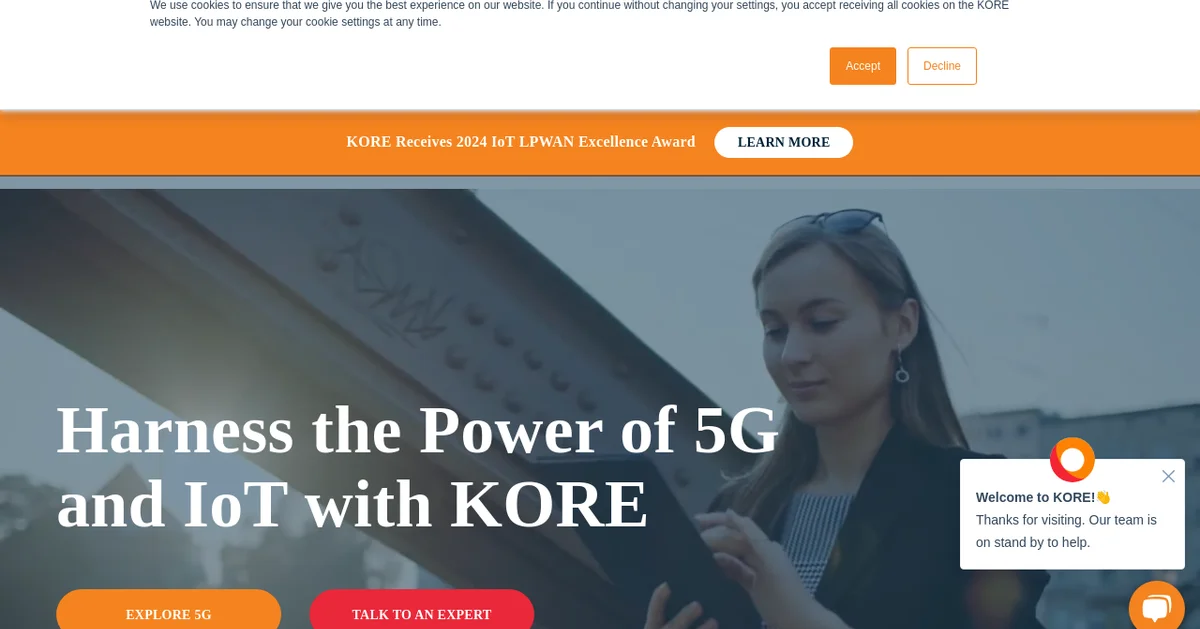
KORE Wireless is a player in the IoT connectivity landscape, focused on helping businesses streamline their IoT operations. Committed to 5G technology and global reach, KORE makes it easy for companies to access the bandwidth and coverage they need without complex systems. Their emphasis on simplicity and user-friendly solutions distinguishes them in the market.
One standout feature of KORE is their variety of service offerings. Whether you need managed tablets, preconfigured routers, or gateways, they provide tailored solutions that fit business needs. This flexibility is a strong selling point for organizations looking to deploy IoT solutions efficiently. KORE also invests in innovation, offering services beyond connectivity, such as eSIM technology, data analytics, and IoT security measures. This helps businesses connect their devices while gaining valuable insights and maintaining security.
Another important aspect of KORE’s approach is their global and independent model. With various carrier partnerships, companies can choose the best options based on location and technology requirements. This independence is appealing to organizations that want to avoid being locked into a single carrier and adapt as their needs change.
KORE’s focus on customer support is another advantage. Their team works closely with clients to ensure smooth implementation and ongoing assistance, fostering long-term relationships that can improve success in the IoT journey.
Pros:
- Global coverage options that protect against carrier lock-in
- Comprehensive service offerings tailored to specific needs
- Strong focus on innovation in IoT technologies
- Committed customer support for seamless onboarding and management
Cons:
- May not be as well-known as larger competitors
- Specific features or technology options could be limited for niche applications
Aeris Communications
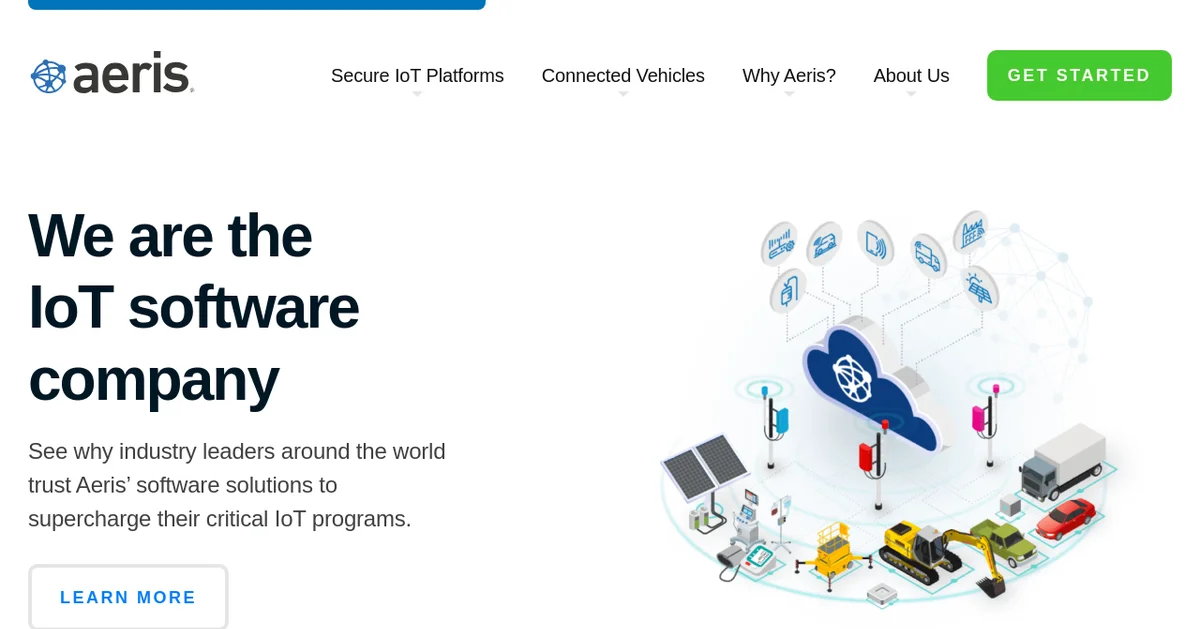
Aeris Communications is a key player in the IoT connectivity sector, specializing in software solutions that help businesses streamline IoT initiatives. They provide secure platforms for global cellular deployments, addressing the challenges organizations face as they scale. Their goal of maximizing return on investment for IoT projects appeals to businesses that require connectivity and effective management of IoT data and devices.
Aeris’s extensive suite of Software as a Service (SaaS) tools, especially for connected vehicles, positions them well in the automotive sector, serving both vehicle manufacturers and mobile operators. Their platform gives enterprises visibility and control over IoT programs, enabling them to optimize and monetize their initiatives.
Aeris’s commitment to innovation and partnership drives their success. They build relationships with mobile operators and original equipment manufacturers, helping deliver reliable connectivity to a global audience. This collaborative approach enhances their offering and broadens their reach, differentiating them from competitors like alt_13, who may lack such a robust foundation of partnerships.
Aeris’s offerings include improved security for IoT applications, a user-friendly management platform, and strong analytics capabilities. This combination ensures businesses have the connectivity they need and the tools to make informed decisions based on real-time data.
Pros
- Comprehensive SaaS tools for automotive digitalization
- Strong focus on secure global connectivity
- Effective management platform for IoT applications
- Recognized by industry leaders and awards for innovation
Cons
- May be seen as complex for smaller businesses
- Focus on automotive could limit broader IoT application visibility
- Established partnerships may reduce flexibility for custom solutions
Eseye
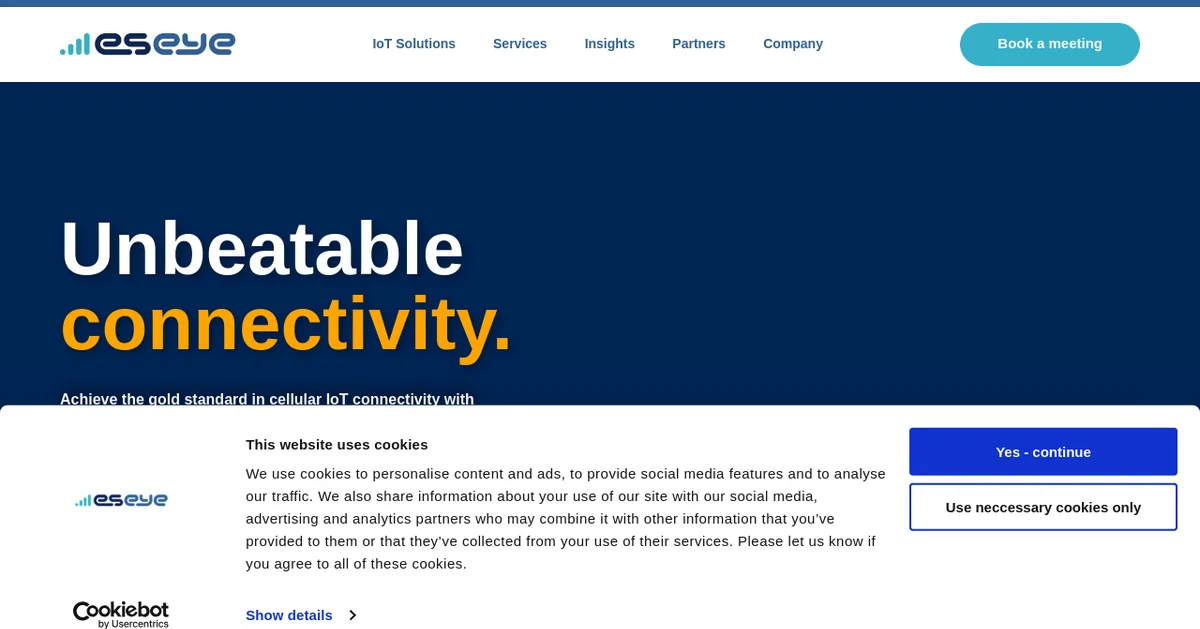
Eseye stands out as a strong alternative to Hologram.io in the IoT connectivity solutions space. Their focus on delivering global connectivity through a single eSIM is appealing for businesses seeking reliability and ease of management. With over 1,000 projects executed and coverage across 190 countries, Eseye promises a level of worldwide reach that can support various IoT initiatives.
What makes Eseye unique is their comprehensive service model. They provide connectivity and guide companies through the entire lifecycle of their IoT projects. From initial concepts to deployment, their experts work alongside client teams, addressing potential roadblocks and ensuring everything runs smoothly. This hands-on approach gives clients confidence, knowing they have a partner invested in their success.
Eseye’s connectivity management platform is another notable feature. Businesses can manage and optimize their IoT deployments efficiently, protecting their investments. This platform hosts many mobile network operator (MNO) connections, allowing devices to maintain connectivity no matter where they are. This level of adaptability and reliability differentiates Eseye from competitors like Hologram.io.
Their reputation is further supported by recognition from industry leaders, including being named a Visionary in Gartner’s Magic Quadrant for Managed IoT Connectivity Services. This accolade indicates Eseye’s strong market position and commitment to innovation. Clients often cite their excellent customer service, highlighting quick response times and a proactive approach.
Eseye offers global coverage, an intuitive connectivity management platform, dedicated support, and a partnership philosophy that appeals to organizations seeking a reliable IoT connectivity solution.
Pros
- Global coverage with a single eSIM
- Support throughout the entire IoT project lifecycle
- Strong connectivity management platform for easy optimization
- Industry recognition as a leader in IoT connectivity
Cons
- Potentially higher investment for management services
- May require time to integrate their services into an existing stack
- Limited focus compared to broader connectivity solutions outside IoT
Telit

Telit is a key player in the IoT connectivity market, offering a variety of services to help businesses integrate connected technologies into their operations. Founded to simplify IoT deployment and management, Telit is known for its IoT modules and cellular data plans. Their focus includes enabling businesses to use edge AI and secure data orchestration solutions to improve operations and achieve desired outcomes.
A standout feature of Telit is its extensive portfolio of certified cellular modules, which can function independently or be combined for custom solutions. This flexibility helps businesses choose what fits their needs. They deliver quick, cost-effective solutions for projects of all sizes, providing a significant advantage for companies dealing with complex IoT environments. Telit also emphasizes data-driven approaches, allowing companies to merge their operational technology (OT) and information technology (IT) seamlessly.
Telit serves various industries, from retail to logistics, using IoT to address specific challenges, such as improving digital signage in retail or boosting cold chain logistics efficiency. Their expertise in custom solutions and AI integration increases the effectiveness of IoT applications.
As an alternative to Hologram.io, Telit is a strong candidate due to its diverse product offerings and industry experience.
Pros
- Wide range of certified IoT modules
- Custom solutions tailored to business needs
- Focus on integrating AI and machine learning
- Quick deployment and cost-effective management
Cons
- May have a steeper learning curve for newcomers
- Enterprise solutions may not suit smaller projects
Soracom
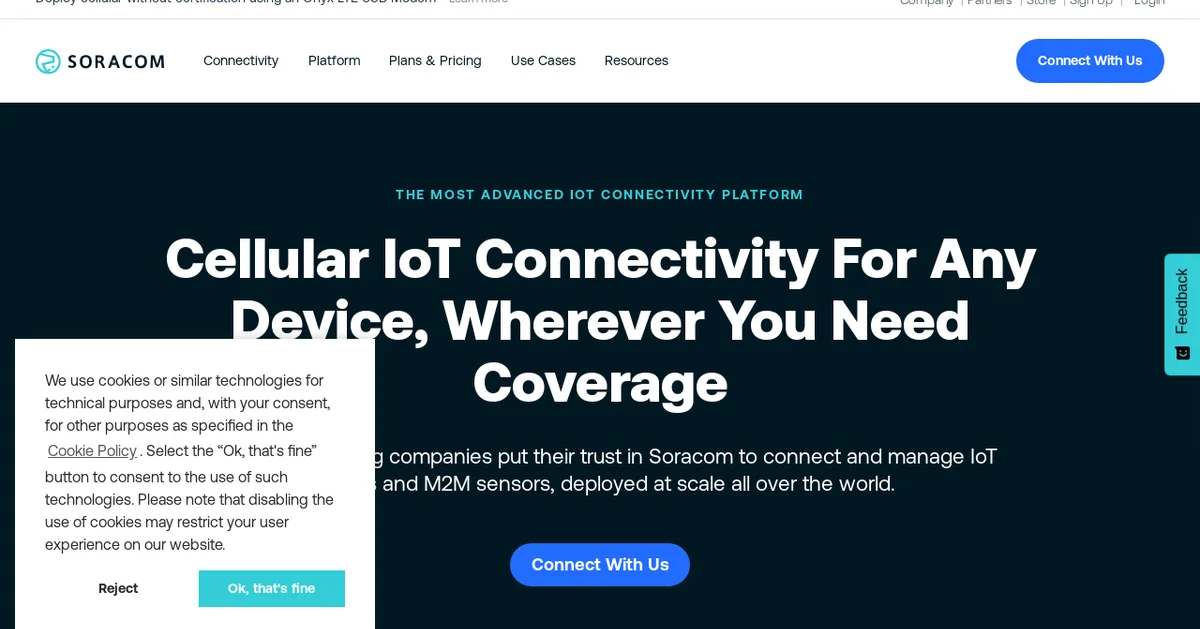
Soracom is a player in the IoT connectivity solutions sector, offering a platform designed for the needs of IoT devices. Their unique proposition lies in multi-carrier capabilities, allowing users to switch between networks using a single IoT SIM. This flexibility removes the hassle of researching different carrier coverage maps, making connectivity simple, whether managing devices globally or just in the U.S.
Starting with a focus on simplifying IoT integration, Soracom has expanded to cover 160 countries. Their pay-as-you-go pricing model supports scalability, benefiting businesses that expect growth or changes in their IoT deployment sizes. The ease of connecting to various cellular networks, including AT&T, T-Mobile, and Verizon, lets businesses adjust their connectivity solutions quickly.
Soracom’s advantage isn’t just connectivity; it provides a toolkit for managing IoT challenges. With features like cloud integration, secure private networks, and remote device access, businesses can control their IoT deployments effectively. These functions set Soracom apart from alternatives like alt_13, which may focus more on connectivity than on extensive management tools.
For companies seeking not just a connection but a partner in navigating IoT challenges, Soracom stands out.
Pros
- Multi-carrier coverage with a single SIM
- Pay-as-you-go pricing model
- Global reach, covering 160 countries
- Toolkit for IoT management
- Secure private network options
Cons
- May not be the cheapest option for all use cases
- Some advanced features might require a learning curve
- Primarily cellular, which may not suit every IoT application
Monogoto
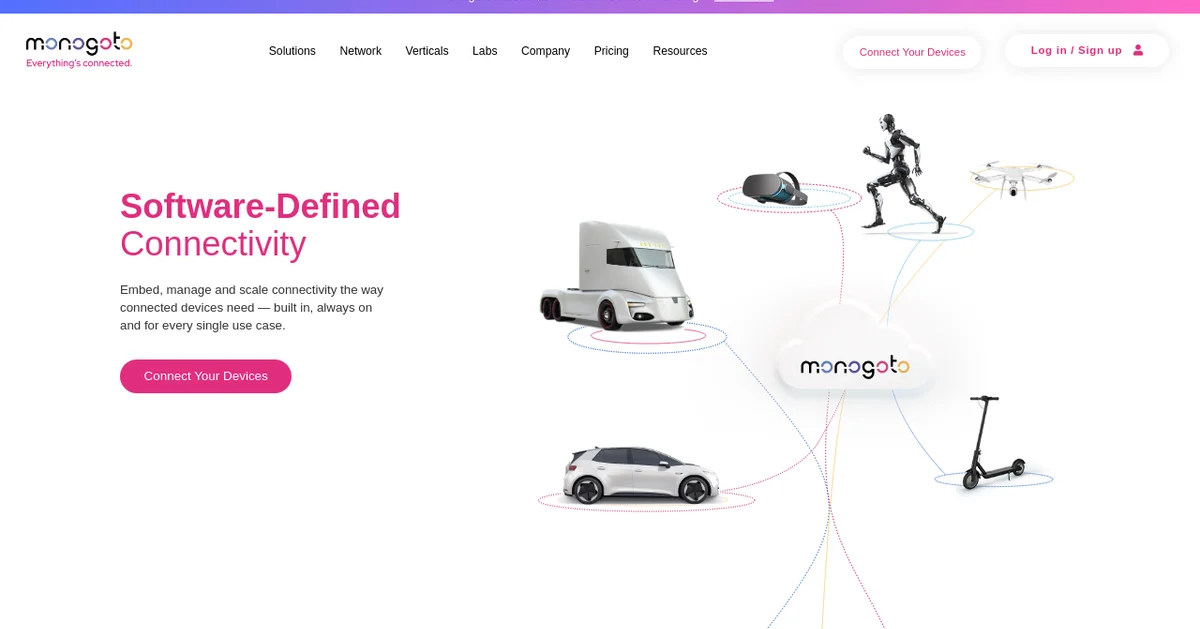
Monogoto is a new player in the IoT connectivity landscape, focusing on “software-defined connectivity.” They offer flexible solutions that adapt to the needs of connected devices. Monogoto aims to provide connections that are always on and tailored.
Their positioning comes from a combination of global reach and a centralized system. With access to 550 networks across over 180 countries through a single protocol, they make scaling connectivity easy. You can connect your devices anywhere in the world with one subscription, simplifying management for businesses expanding internationally.
One standout feature is their automation in context. Monogoto responds to real-time events, allowing companies to adjust their connectivity based on specific conditions. A device can operate differently during peak hours than it does during quieter times, optimizing performance and efficiency.
They also offer control over the types of connectivity. This flexibility lets businesses maintain security, compliance, and software updates while managing energy consumption effectively. Monogoto supports various use cases, from smart city streetlights to vehicle telematics, demonstrating their versatility.
A driving force behind this innovation is their recent Series A funding, which has boosted their growth and service offerings, positioning them to compete in an evolving market.
Pros
- Software-defined connectivity that adapts to device needs
- Extensive global network access through a single subscription
- Real-time automation for connectivity adjustments
- Control for security and energy management
- Versatile use cases across different industries
Cons
- As a newer player in the market, some may have concerns
- Potential challenges for businesses managing multiple device types
- Requires understanding of their API for full integration benefits
Orange Business Services
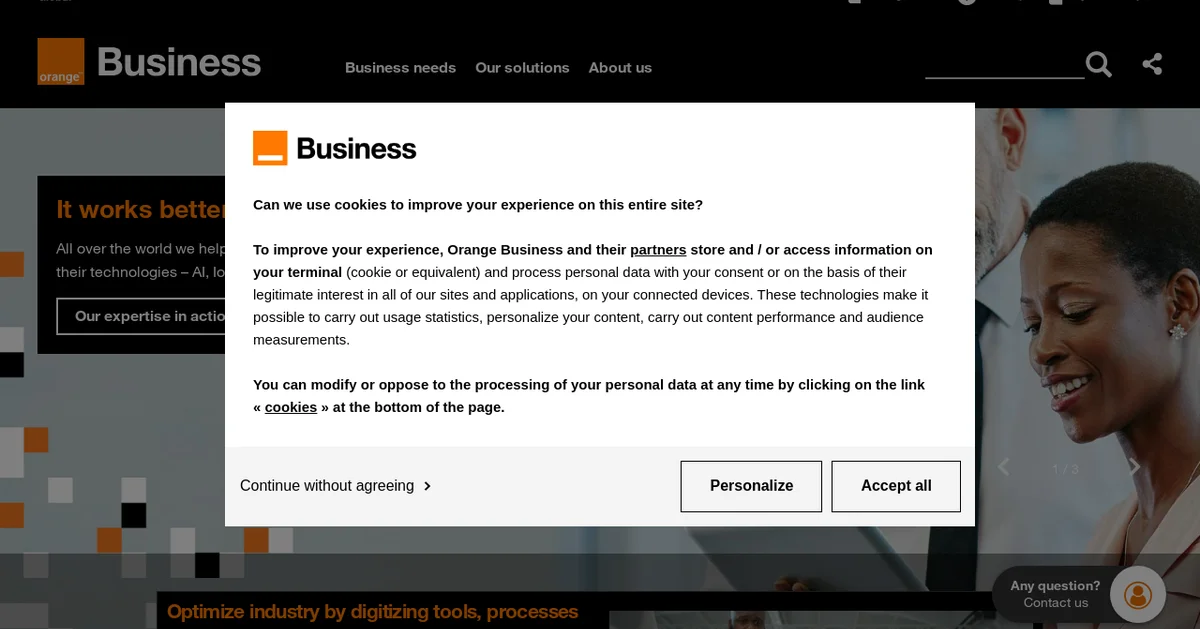
Orange Business Services is a key player in IoT connectivity solutions, serving as a partner for businesses pursuing digital transformation. Their origins trace back to Orange, a recognized telecommunications company. They’ve broadened their expertise into cloud solutions, cybersecurity, and application integration, making them a complete provider for industries aiming to improve operations through technology.
One key feature of Orange Business Services is their focus on tailoring solutions to the needs of each business. They understand that companies vary, and their service offerings are customizable. This approach helps organizations streamline processes and discover new business models. With an emphasis on boosting productivity and fostering collaboration, they offer tools that enable employees to work effectively and communicate across various platforms.
Another advantage is Orange’s global reach. Operating in 65 countries, they maintain a broad presence that allows them to deploy and manage solutions efficiently across different markets. This extensive network provides businesses with security and reliability, helping them navigate the complexities of digital transformation.
While both Alt_13 and Orange Business Services provide IoT connectivity solutions, Orange’s strength lies in integrating cloud and cybersecurity into a unified digital infrastructure, beneficial for businesses aiming to safeguard their data while improving operations.
Pros
- Customizable solutions for specific business needs
- Strong emphasis on productivity and collaborative tools
- Global presence offering reliable support and service
- Comprehensive offerings that include cloud and cybersecurity
Cons
- May require a significant investment for full integration
- Complexity of solutions might not suit smaller businesses
- Potential for slower implementation due to customizations
Thales
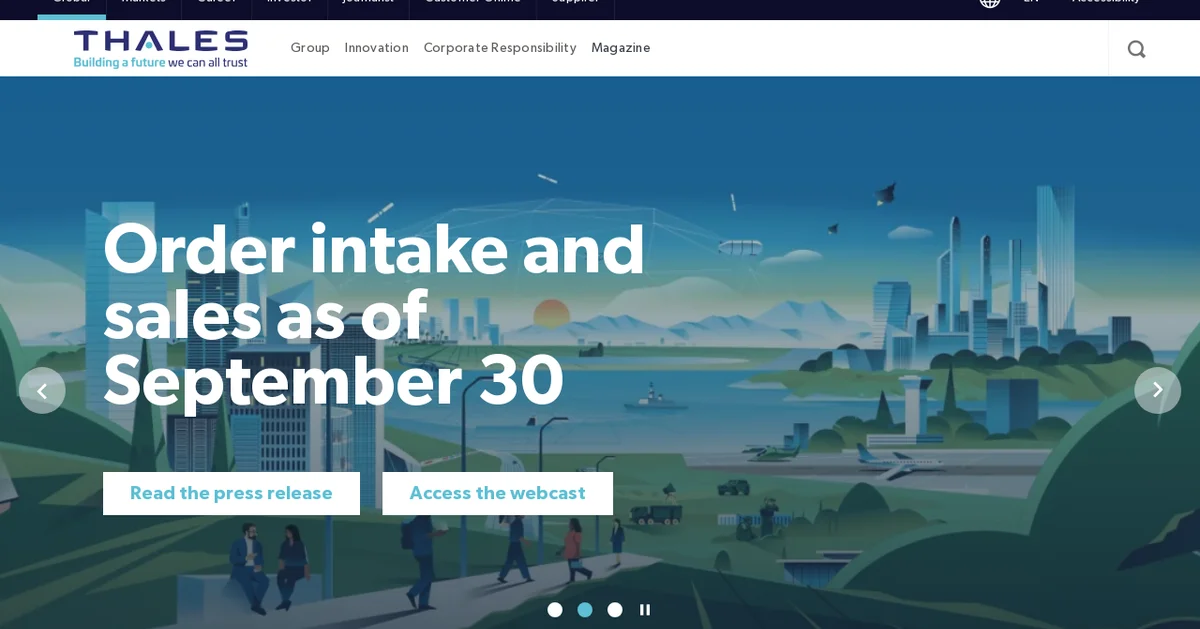
Thales is a key player in the IoT connectivity solutions market, offering a range of technologies and services. With a history of providing tailored solutions for various sectors, Thales has built a reputation as a trusted partner for securing data and improving connectivity. Their mix of cybersecurity, data protection, and IoT services distinguishes them from others. Thales emphasizes integrated solutions; for example, they’ve developed smart airport security systems that combine biometric technology with operational efficiency. This solution addresses challenges faced by airports, demonstrating Thales’s commitment to practical offerings.
A notable aspect of Thales is their focus on security within IoT connectivity. As threats evolve, their expertise in cybersecurity keeps data flowing through their networks secure and compliant with regulations. Thales maintains a strong position in this area through collaborations across various industries, helping organizations manage complexities in aerospace, defense, transportation, or critical infrastructure.
Thales’s story reflects innovation and adaptability. They continually evolve, merging their capabilities to meet market demands. This flexibility enables them to offer customized solutions and a forward-thinking approach that aligns with businesses seeking trust and reliability in connectivity partners.
Pros
- Comprehensive IoT solutions with a strong focus on security
- Proven track record in high-stakes sectors
- Integrated systems that tackle multiple operational challenges
Cons
- May not be as specialized in niche IoT areas as some smaller competitors
- Larger corporate structure could lead to slower response times for specific needs
Digi International
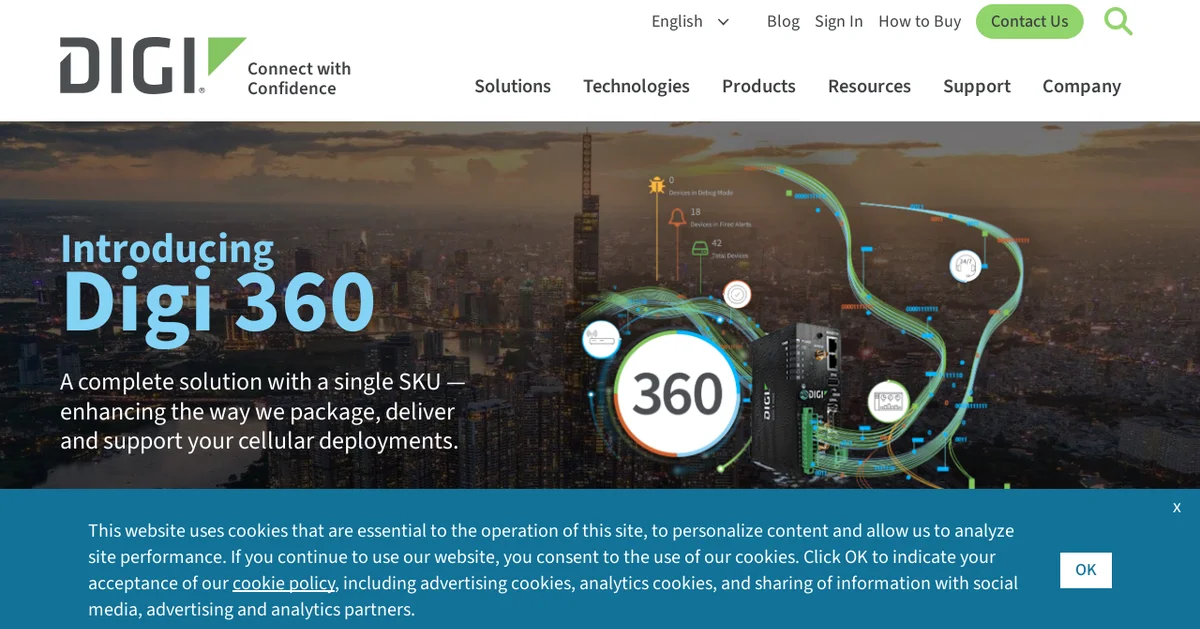
Digi International has established a significant niche in the IoT connectivity solutions sector. With a focus on innovation and reliability, they provide a suite designed to meet the various needs of the industrial IoT market. One standout offering is Digi 360, which simplifies cellular deployments through a single SKU, improving how products are packaged, delivered, and supported.
Digi’s story is rooted in a commitment to connectivity. They serve a wide range of industries, from retail and banking to transportation and smart cities. This extensive service range showcases their ability to adapt to different applications, whether it’s outdoor digital signage or remote industrial monitoring.
A key differentiator for Digi is their strong focus on the industrial IoT space. Their ruggedized cellular solutions are built to withstand harsh conditions, making them suitable for applications where durability is essential. They also offer remote device management through Digi Remote Manager, providing businesses with tools to monitor, configure, and secure their devices, even when managing a large network.
Recent advancements, including the Digi ConnectCore MP2 with its integrated neural processing unit for edge AI applications, reflect their focus on technology to address market demands. The addition of Linux and improved Windows support for products like Digi AnywhereUSB Plus further highlights their commitment to compatibility and versatility.
Digi International stands out as a reliable alternative to alt_13 for organizations seeking scalable and durable IoT solutions. Their extensive product lineup, combined with strong remote management capabilities and emphasis on ruggedization, positions them well to address critical connectivity needs across various industries.
Pros
- Comprehensive IoT solutions with wide industry support
- Strong remote management tools for large deployments
- Ruggedized products for harsh conditions
- Innovative developments like AI processing in IoT devices
Cons
- Potentially limited to industrial applications compared to broader consumer-oriented solutions
- Initial setup can be complex depending on the deployment size
Thingstream
Thingstream is a player in the IoT connectivity solutions space, providing a strong alternative to Hologram.io. They enable reliable and cost-effective communication for IoT applications. One of their key features is support for various connectivity options, including cellular, satellite, and short-range technologies. This flexibility makes them suitable for many applications, from remote asset tracking to smart cities.
The company’s mission is to simplify connectivity for IoT devices. They recognize that dependable communication is vital for the growth of the IoT ecosystem. Their solutions ensure data is transmitted securely and efficiently, regardless of the environment. By offering access to multiple networks, Thingstream stands out as a versatile choice, particularly attractive to businesses seeking seamless integration across different platforms.
What sets Thingstream apart is not just their technology but also their commitment to improving the user experience. They provide tools and resources that help developers connect their devices and manage data with ease. Their straightforward approach can significantly reduce the complexity often faced with IoT implementations.
Choosing Thingstream offers companies flexibility, reliability, and a supportive ecosystem for their IoT needs.
Pros
- Wide range of connectivity options
- Diverse applications from asset tracking to smart cities
- Focus on security and efficiency
- Strong developer support and resources
Cons
- May lack some advanced features found in competitors
- Depending on the use case, pricing can vary significantly